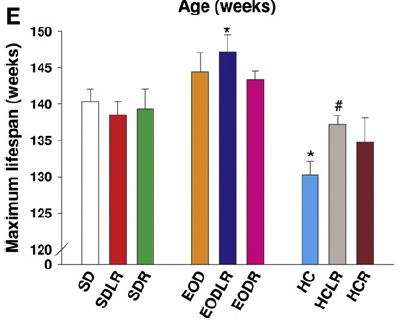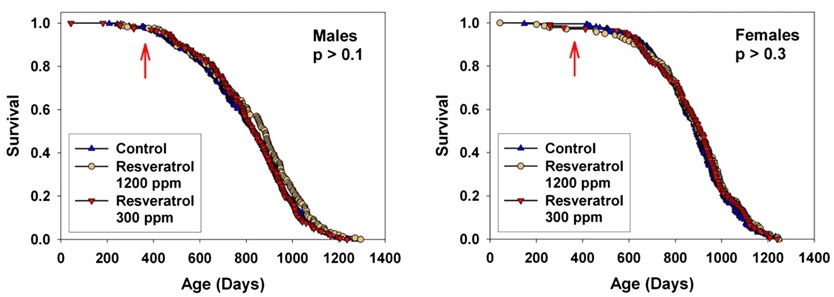Sinclair's earlier study showed that EOD fasting plus resveratrol extended lifespan slightly more than EOD fasting alone in mice.
Maybe. The numerical difference was nonsignificant.
My recollection was the de Cabo* study found statistical significance to the combination, in fact resveratrol feeding extended both mean and maximal lifespan by 15% over Standard Diet controls.
our EOD feeding regimen was initiated at 12 months of age, and while average life span was increased, the effect did not reach statistical significance, except in combination with resveratrol (EODLR versus SD).
So EOD feeding as a stand in for CR did extend life span significantly, except with the addition of resveratrol.
Sorry, I put that poorly. Your summary is correct; the question is where the actual differences lie. If you look at the max survival data:

... you see the effect that you describe. And certainly, the survival of the EOD+low-dose Res lived longer (and statistically significantly longer) than SD, while EOD alone did not live significantly longer than SD (anyone who thinks this is a shocking revelation, please
read this). But the
nominal difference between EOD and SD
looks larger than the
nominal difference between EOD and EOD + low-dose res, and there's no statistically significant difference between the latter 2. So the question is whether there is or is not a real difference between EOD and EOD + low-res, and also whether there was a real difference between SD and EOD alone.
The "curve-squaring" effect looks more impressive on the graph:

... but (a) as noted, it'd've been more impressive if they'd've had somewhat longer-lived, squarer-curved controls, and (b) the differences are again NS (personal communication, Pearson), so that could be noise, too.
And, there's the awkward fact that high-res made EOD animals live
nominally SHORTER lives than EOD alone ...
And:
resveratrol-fed elderly mice show a marked reduction in signs of aging, including reduced albuminuria, decreased inflammation, and apoptosis in the vascular endothelium, increased aortic elasticity, greater motor coordination, reduced cataract formation, and preserved bone mineral density.
Yes. And on that point:
Attractive as this 'healthy lifespan' reasoning is intuitively, it does run up against the fact that healthy organisms don't just drop dead. If the animals are more functional on one parameter, but are dying just as quickly, it implies at the least the ongoing progression of a life-limiting pathology, which isn't really 'healthy lifespan,' or alternatively an active acceleration of death from some other cause of death against which the expected benefit of greater health in other areas is counterbalanced.
Michael, I think you miss the point. There are two ways to die at age 80 [...] While we prefer no death period, which would be the preferable way to grow old.... healthy or disease ridden? If resveratrol decreases any chance of the latter ...it is a worthy supplement.
I agree, of course. The question is whether it actually does that, and whether we can meaningfully take advantage of it. Yes, the headline results from Pearson et al were impressive on that regard, but when you dig down there's a lot of variability in its realization by dose, gender, and feeding regimen; and, we still dont have a clue how to translate the pharmacokinetics. And, it still leaves my concern above unaddressed; please cogitate

.
Reference* Pearson KJ, Baur JA, Lewis KN, Peshkin L, Price NL, Labinskyy N, Swindell WR, Kamara D, Minor RK, Perez E, Jamieson HA, Zhang Y, Dunn SR, Sharma K, Pleshko N, Woollett LA, Csiszar A, Ikeno Y, Le Couteur D, Elliott PJ, Becker KG, Navas P, Ingram DK, Wolf NS, Ungvari Z, Sinclair DA, de Cabo R.
Resveratrol Delays Age-Related Deterioration and Mimics Transcriptional Aspects of Dietary Restriction without Extending Life Span. Cell Metab. 2008 Aug;8(2):157-68. PMID: 18599363
















































